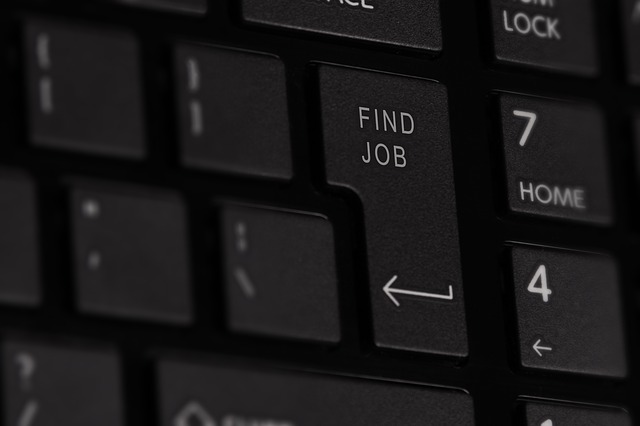When project management leader Martyn Lindley’s position was eliminated at Hewlett-Packard after 19 years with the company, he knew he faced a job hunting challenge. He needed to find another senior-level role in a desirable company without relocating from his home in a smaller city.
After a 7-month search involving tireless networking, online applications, and experiencing interviews with panels, chatbots, and hiring managers in coffee shops, he landed his perfect-fit role as project manager, Global Business Services at Levi Strauss & Company.
Here’s Martyn’s story:
DB: Why were you in the job market?
I’d worked at Hewlett-Packard for 19 years and was routinely promoted in positions with progressively more responsibility, then my position was eliminated in October 2017.
DB: What were the hardest / most frustrating things about job hunting?
I’d weathered many layoffs in the 19 years I was at HP, so it had been a while since I’d looked for a job. I immediately found out that job hunting has radically changed—most noticeably the frenzied pace and pressure companies are under to get candidates. And once I’d made contact with a company—whether it was after I’d sent an application, or after an interview by phone or in-person–few people took the time to get back or give status updates. It was on me to always follow up. I think this behavior is indicative of society in that it’s so digital and fast-paced, that you don’t get confirmation or the satisfaction of people giving honest feedback. That process has been bypassed. The lack of feedback was by far the hardest part.
DB: What were your most effective job search tactics?
First, I made sure to have my resume ready, my messaging and interview skills polished with mock interviews, and a cover letter ready to go. I made sure I was active on LinkedIn for both networking and sourcing jobs. I went to a job seekers group to make sure I was getting out of the house and being around people in the same situation. In-person networking was important, but I ultimately found this job via an online application. I kept a very narrow geographic scope. You must have an integrated search.
DB: How did your interview go at Levi’s?
Actually, the day of the interview I was in a really bad mood. I was feeling discouraged by the job hunt. But by the time I arrived, I walked in feeling confident and I was myself. I read the interviewer and got a sense for his personality. I didn’t have the exact background they wanted, but I discussed the parallels as to what I could do and focused on the experience I did have. I was brutally honest about what I could and couldn’t deliver. I had 5 interviews total in the span of a week. You’ll find someone who’ll love you eventually!
DB: How many companies did you interview with before landing this job?
I replied to 300 applications, talked with 15+ companies, and made it to ~30 in-person interviews. The strangest experience was when I interviewed via my PC with a chatbot. There wasn’t much two-way communication!
DB: What were some of the more unusual questions you were asked?
Panel interviews were the hardest because there’s the challenge of trying to come up with multiple scenarios. That’s why having many stories is so important. Interviewers also ask intricate situational questions with very specific circumstances. In the interview that landed me this job, my boss said, “Alright, I’m going to give you 3 minutes. Sell me. Let me know what you can do for this company.”
DB: Did you ever interview off site, at a restaurant, coffee shop, or brew pub?
A couple of times. I had an interview with a senior marketing executive who kept texting me, changing the timing and location. We eventually met at a coffee shop, but at one point, I started to think it was some kind of test to see whether I’d go through hoops to meet. It was a lot more informal.
DB: What was the most popular process? Phone screen? Video?
80% of my interviews began with a human resources phone screen. I was in many panel interviews with up to 6 interviewers, and those weren’t my forte. It’s hard to appeal to and fully engage with everyone on the panel.
DB: Did you ask for feedback after interviews? Do you feel employers were honest when they gave you feedback?
Yes I did. When they took the time to give feedback, it did seem pretty honest, but mainly the pace was such that they wouldn’t take the time.
DB: What were some of your favorite job search resources?
As I mentioned earlier, LinkedIn is an obvious one. I paid for the premium version during my search, so I could maximize its features and flexibility. It’s a great tool to identify networking contacts and to prepare for interviews. I used it to look up all the interviewers and researched the company. I also paid for the Ladders premium version.
DB: What advice would you give to others who are conducting a search? About interviewing?
Like the famous quote goes, “Don’t give up, don’t ever give up.” Treat your job search as a job. Get up each day and push yourself as you would in a job. When you’re interviewing, go into the interview like you’re interviewing them as much as they’re interviewing you. Ask hard questions. And above all, stay confident and positive, because you have valuable skills to offer, you just need to find the right fit.

I’m Dalena Bradley, job interview coach and career marketer dedicated to helping you communicate your value, stand out from the competition, and win the job!
Contact me to discuss how we can collaborate.

